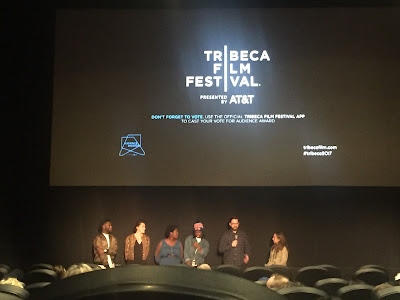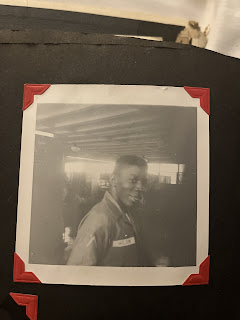"For Ahkeem": Fight the Stereotype
In my cultural ramblings around New York City, I've made it an annaul tradition to attend the Tribeca Film Festival. This year, a film entitled “For Akeem” was premiering on a Tuesday night. The description of the film online seemed a little foggy but interesting so though I was still trying to get over a sinus infection, I headed out into the rain to "do it for the culture".
“For Ahkeem” is about 3 years in the life of Black, high schooler, Daje (Boonie) Shelton living outside of St. Louis, MI before, and in the aftermath, of the murder of Mike Brown at the hands of the police. There is so much going on in this film, from criminalization of Black men to stereotypes being thrown around to self-fashioning leading ou to overcome obstacles to sheer perseverance and will power. In the docu-narrative, we see Boonie fighting against the hood lifestyle she’s been surrounded by since childhood, struggling to overcome hardships in math that nearly prohibit her from graduating, and, despite all her and her mother’s hard work, becoming pregnant during the end of her junior year. Boonie repeats time and again that even though she has her baby, Ahkeem, the father of whom is still very present, she won’t let that stop her from accomplishing her dreams. She admits it may slow her down, but refuses to let it stop her. The baby’s father, Antonio, is almost the polar opposite of Boonie, seeing no value in school and, during the course of the 3 years, getting sent to juvenile detention once, pleads guilty to a drug felony, and is placed two separate paroles simultaneously.
This film was provocative due to the duality of the these two characters. Boonie was fighting against stereotypes of black girls from the hood staying there and living their lives, by striving to complete high school as well as attend college, despite getting pregnant young. Antonio, though he struggled with criminalization of male Black youths, lack of legal counsel led him to plead guilty to a felony drug charge at the age of 17 which, in today’s society, automatically dooms his future. One headhunter from a nearby church came to speak to him about a possible job in construction but, upon finding out Antonio had a felony, had to rescind the offer. Instead of letting herself fall into the same traps Antonio did, though Boonie did love and care for him, she persevered towards her goal, even as she received calls from him in juvie. It was telling that Boonie’s support systems at home from her mother and from all her teachers, counselors, and even the principal at school, continuously told her she could succeed and she would succeed, she just had to put in the work. The positive effects this reassurance and uplift had were clearly visible, while Antonio’s friends did nothing but encourage him to forget school because “you don’t learn anything anyway.”
One particularly poignant part of the film was when Boonie and Antonio were sitting by the lake one day talking. Boonie expressed dreams of moving away from St. Louis and going somewhere better for her and baby Ahkeem. Antonio vehemently rejected the idea, saying he knew he would never leave St. Louis because that was all he knew. It points to stereotypes of “hood” kids never having dreams of making it out of the hood and on to a better life as well as socioeconomic factors that can make any thought of the future seem fairly dim and hardly worth it.
At the end of the screening, the two directors as well as a producer, a videographer, an editor, and Boonie herself, came out to have a panel discussion with the crowd. I found it interesting that the film was conceived of and directed by two white, Williamsburg-archetype Caucasian men. During the discussion, an audience member asked if Boonie was pleased with the way her story was told and if she felt it was accurate. It was pleasing to hear Bonnie respond she did feel the film portrayed her life accurately during those years. She did also have creative direction and the ability to tell the filmmakers what she did not want shown, if anything. It’s refreshing to know a young, Black girl letting her life be seen by the world on the big screen had agency in how her story was told. It was equally as refreshing to see how much agency Boonie took in her own life as well, being an active creator of her future along with having so many people in her life constantly reassuring her and pushing her to prevail. Antonio’s struggles though, were hard to watch, particularly because of how many other young Black men end up being pushed down that same path. At the close of the panel, Boonie informed us that though Antonio had been re-tried for the past vehicular theft felony and received 7 years in prison as a result, Boonie, now with 2 children, was enrolled to attend radiology school for the fall 2017 semester.
What a story indeed.
The official website for the film is linked here.
“For Ahkeem” is about 3 years in the life of Black, high schooler, Daje (Boonie) Shelton living outside of St. Louis, MI before, and in the aftermath, of the murder of Mike Brown at the hands of the police. There is so much going on in this film, from criminalization of Black men to stereotypes being thrown around to self-fashioning leading ou to overcome obstacles to sheer perseverance and will power. In the docu-narrative, we see Boonie fighting against the hood lifestyle she’s been surrounded by since childhood, struggling to overcome hardships in math that nearly prohibit her from graduating, and, despite all her and her mother’s hard work, becoming pregnant during the end of her junior year. Boonie repeats time and again that even though she has her baby, Ahkeem, the father of whom is still very present, she won’t let that stop her from accomplishing her dreams. She admits it may slow her down, but refuses to let it stop her. The baby’s father, Antonio, is almost the polar opposite of Boonie, seeing no value in school and, during the course of the 3 years, getting sent to juvenile detention once, pleads guilty to a drug felony, and is placed two separate paroles simultaneously.
This film was provocative due to the duality of the these two characters. Boonie was fighting against stereotypes of black girls from the hood staying there and living their lives, by striving to complete high school as well as attend college, despite getting pregnant young. Antonio, though he struggled with criminalization of male Black youths, lack of legal counsel led him to plead guilty to a felony drug charge at the age of 17 which, in today’s society, automatically dooms his future. One headhunter from a nearby church came to speak to him about a possible job in construction but, upon finding out Antonio had a felony, had to rescind the offer. Instead of letting herself fall into the same traps Antonio did, though Boonie did love and care for him, she persevered towards her goal, even as she received calls from him in juvie. It was telling that Boonie’s support systems at home from her mother and from all her teachers, counselors, and even the principal at school, continuously told her she could succeed and she would succeed, she just had to put in the work. The positive effects this reassurance and uplift had were clearly visible, while Antonio’s friends did nothing but encourage him to forget school because “you don’t learn anything anyway.”
One particularly poignant part of the film was when Boonie and Antonio were sitting by the lake one day talking. Boonie expressed dreams of moving away from St. Louis and going somewhere better for her and baby Ahkeem. Antonio vehemently rejected the idea, saying he knew he would never leave St. Louis because that was all he knew. It points to stereotypes of “hood” kids never having dreams of making it out of the hood and on to a better life as well as socioeconomic factors that can make any thought of the future seem fairly dim and hardly worth it.
At the end of the screening, the two directors as well as a producer, a videographer, an editor, and Boonie herself, came out to have a panel discussion with the crowd. I found it interesting that the film was conceived of and directed by two white, Williamsburg-archetype Caucasian men. During the discussion, an audience member asked if Boonie was pleased with the way her story was told and if she felt it was accurate. It was pleasing to hear Bonnie respond she did feel the film portrayed her life accurately during those years. She did also have creative direction and the ability to tell the filmmakers what she did not want shown, if anything. It’s refreshing to know a young, Black girl letting her life be seen by the world on the big screen had agency in how her story was told. It was equally as refreshing to see how much agency Boonie took in her own life as well, being an active creator of her future along with having so many people in her life constantly reassuring her and pushing her to prevail. Antonio’s struggles though, were hard to watch, particularly because of how many other young Black men end up being pushed down that same path. At the close of the panel, Boonie informed us that though Antonio had been re-tried for the past vehicular theft felony and received 7 years in prison as a result, Boonie, now with 2 children, was enrolled to attend radiology school for the fall 2017 semester.
What a story indeed.
The official website for the film is linked here.
 |
| Videographer. Editor. Producer. Boonie. Director. Panel moderator. |

Comments
Post a Comment